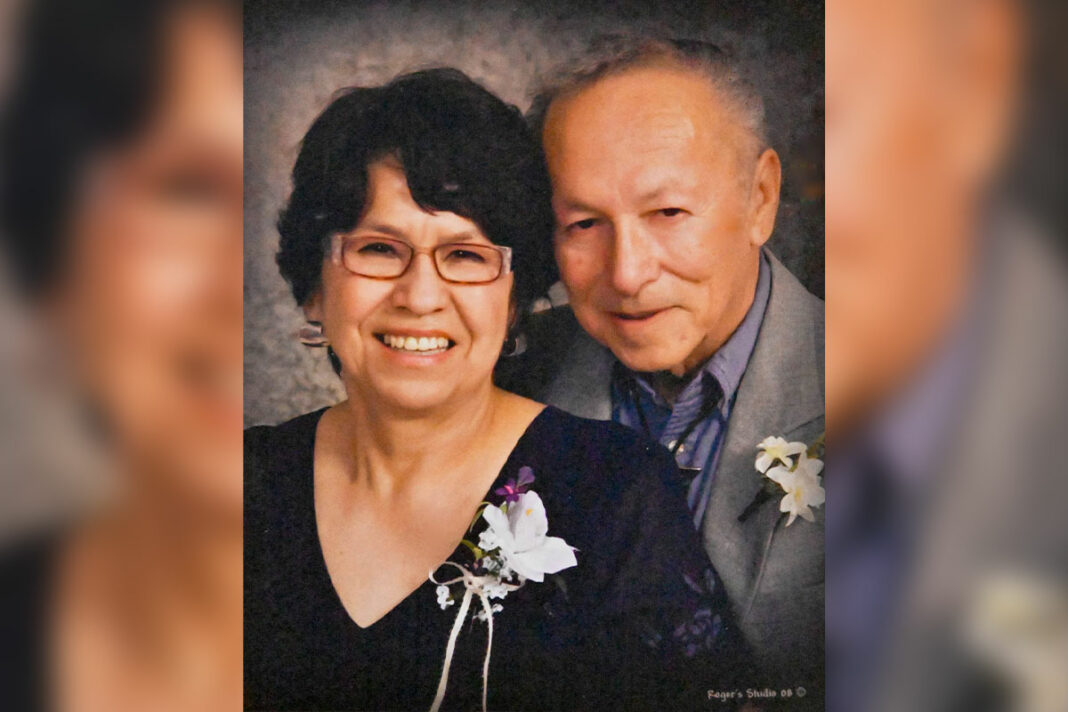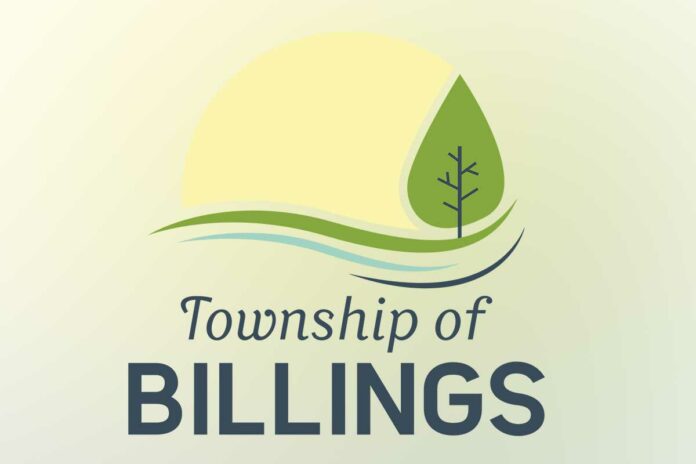Rosemary Wakegijig
Rosemary has been an acquaintance since the mid 1990s when this writer began her role as health director in Wiikwemikoong. Rosemary’s husband Ron had been chief of the reserve and at that time, was employed at the centre as a health worker with a side role as traditional healer. Rosemary had attended the Spanish Residential School before attending St. Joseph’s College for girls in North Bay. After high school, she studied at St. Mary’s Commercial Academy, a Catholic business school. She graduated in 1966 and came back to Wiikwemikoong to work for the DIA, the Department of Indian Affairs in Manitowaning. This was followed by employment with the OPP. Counselling the band’s high school students and helping the youngest children of the community preserve the Anishinabek language is a vital role in Wiikwemikoong.
“My paternal grandparents are John and Anna (Pheasant) Jackson. Their original name was ‘Atchitchakowans.’ John was part of the group that built the stone and wood South Bay Church. He was a hard worker, a farmer and a logger. Rosemary was born in the house he built. Anna took care of the home duties, baking and cleaning. She joined the quilting bees and she was part of the ladies’ group that moved from farm to farm in haying season, cooking for the workers who brought in the oats and the hay.
“My maternal grandparents were Dominic and Jane (Manitowabi) Mandamin. Grandmother Jane often did a man’s work. She would go into the bush to get wood for our fires. Her daughter Annie babysat the younger children while she was away. Jane also had a big garden. She would work in the morning. Each afternoon she would visit other band members that were homebound. She also sang well in church. I don’t recall much about my grandfather. He died when I was still a young child. His brother Sam Mandamin was my Godfather. Jane had two daughters Rose and Annie, who became my mother.”
“Sometime after Grandfather Dominic passed, Grandmother Jane married John Toenaw whose surname was changed to Pelletier. She had four more children: Margaret, Clement, Ernest and Leonard. I was born with the help of a midwife on November 11, 1944 to Annie and Ignatius (Jackson) Atchitchakowans in the Jackson Homestead at South Bay. I would have two sisters, Margaret and Delores. Sadly, dad contracted tuberculosis soon after their marriage and he spent years in the hospital.”
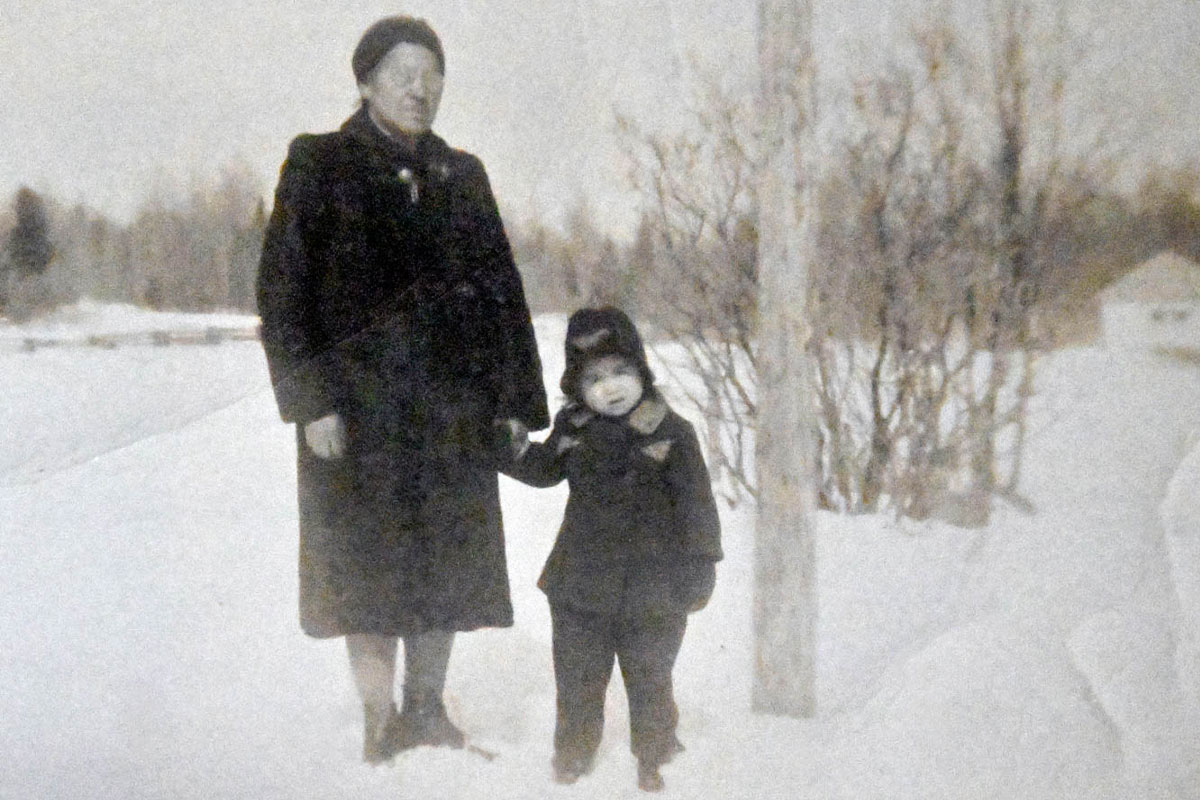
“I remember an early birthday. I climbed the big chokecherry tree in the yard, right to the top. I could see the world! Everybody was at home. I imagined the whole country was closed because it was my birthday. It was actually Remembrance Day, but as a child, it was my day too! Grandmother was soon gazing up at me from the bottom of the tree. ‘Come down and eat your birthday cake,’ she announced. It looked delicious, all covered with icing sugar. Other cousins had arrived to celebrate my birthday. I climbed down to enjoy a special, memorable day.”
“My parents separated. Mother Annie found work in the Blind River Hospital. She had a subsequent relationship and over time, seven more children,” Rosemary continues. “Dad’s mother had gone to a priest and they decided that my two sisters and I should go to their paternal grandmother. Maternal Grandmother Jane’s house was very tiny, but we all lived there for a few years. The house still stands today.”
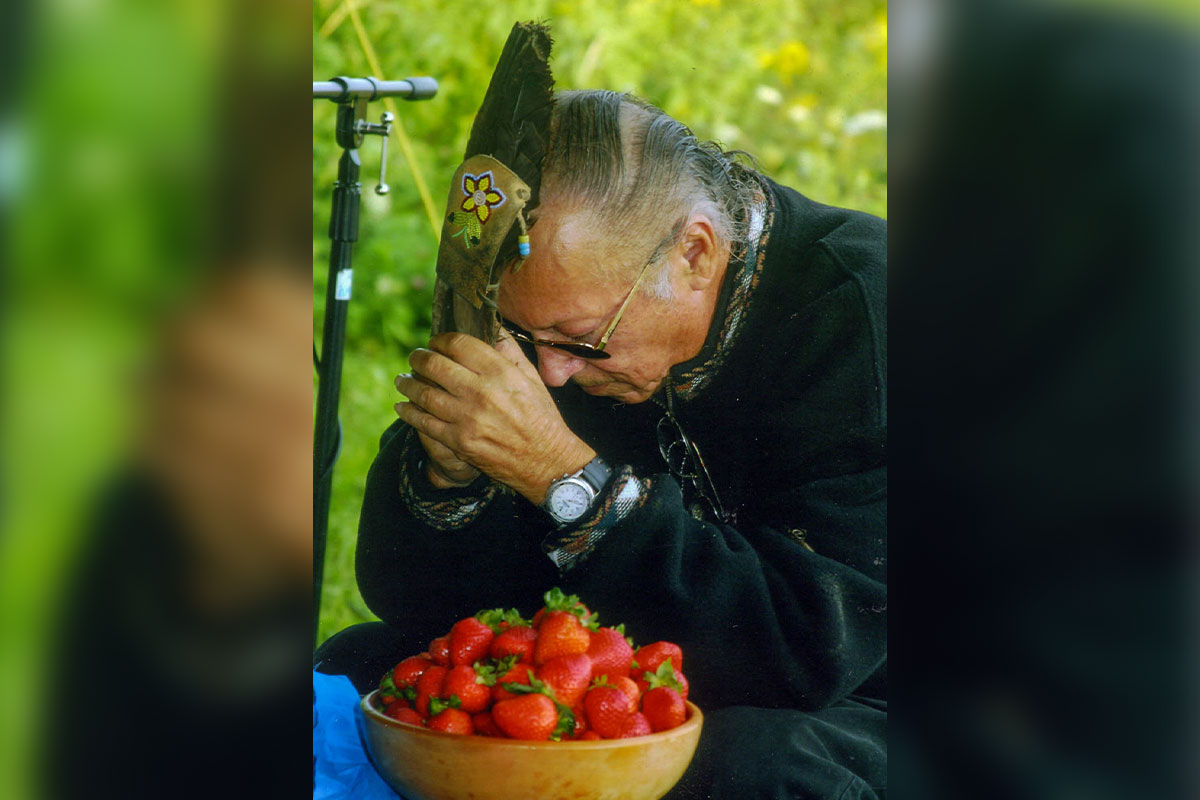
“We went to the Kaboni School, and our teacher was Gertrude Pitawankwat Trudeau, and I liked all subjects except math. Miss Trudeau gave us all a box of eight crayons, which I cherished. When she got married, we gave her a glass bowl as a gift. I was in the baby class, and I took a shortcut through the bush to avoid the four kilometre walk. I was never afraid, even though there were many wild animals there. I had my guardian angels, but my grandmother and my father were concerned with my walking alone.”
“At age seven they pulled me out of school and I could go back when my siblings were old enough to come with me.” We helped at home. Godmother Elizabeth asked that our ‘chores would remain normal for our young ages, six to nine years.’ Horses were part of my responsibility, but I was afraid of them. They were so big and I had slipped on ice pulling up a bucket of water from the deep well and banged my head on the ice, but I did manage to take them to the well to drink.”
“I was older than my classmates when I did get back to school, so they allowed me to skip two grades at the Kaboni School. When it was time for me to go to Residential School, I wanted to go, because everyone came back from there, speaking English. Aunt Rose had gone to the Spanish Residential School. Rose was intelligent and strong in her Catholic faith. She was easy-going, very respectful and not critical of others. She was a good role model.”
“I had heard that the school could be challenging but I hoped for the best. When we got there, we were assigned numbers. I was Number 173; Margaret was Number 172 and Delores was Number 171. It didn’t take too long to understand the routines. I was learning English and learning how to do the chores as defined by this new culture.”

“Kitchen work was popular because it offered the occasional bit of extra food. I looked forward to being there. After our snack, which could include a half-sandwich and an apple, we had to do chores. Miss Partsy, a nun, was our supervisor in the kitchen. I recall peeling 100 lbs. of potatoes one day when I heard her footsteps approaching. I was hoping to get one of the muffins on the table for this arduous task, but I didn’t get one and I was sad to see them flung in the fire.”
“Marilyn Daybutch and I were in charge of ‘correctly’ dusting and sweeping the hallways, stairs and the dormitory’ under the supervision of another nun, Miss O’Driscoll. Occasionally, she could be mean to us, and one day, Marilyn lost her cool and chased her down the hall with the vacuum cleaner. The vacuum sucked up her stockings. Recently I chatted with Marilyn and chuckled over this event, but Marilyn couldn’t recall it.”
“Another girl, Mary Neganigwane from Sheshegwaning, was being lectured one day. She was standing beside a big window when suddenly she fell back and her arm went through the glass window. She was badly cut and spent a week in the infirmary. She came back with a bandaged arm. Another nun, Miss La Victore was in charge of the infirmary. I don’t recall anyone ever being sent to a hospital. A head lice infestation was another issue. All our hair was cut short. A tiny bit of my ear lobe was cut in the process, but it healed. They covered our heads with coal oil and wrapped towel turbans around our heads. The next morning the lice were all dead and our scalps were white.”
“When we were in the washroom, Margaret and I could speak our language. One time a nun caught us speaking Anishnaabe, and I can still feel her pinching my cheeks when I emerged from the bathroom. It left bruises.” Rosemary looked up at the nun and innocently asked, ‘If I am made in the image of God, why are you hurting me?’”
“We did some role playing another time. I was the teacher and I had a few students I was to instruct. I chose the opportunity to pinch a few cheeks. Apparently, that was not allowed at our level. I was sent to the office and reprimanded.”

Rosemary came home after she finished Grade 6 and completed part of Grade 7 at the Kaboni School. “At Christmas that year, the Pontiac School was completed, and we were transferred there to finish Grade 7 and take Grade 8 and 9. At home, I had regular chores. Helping with the big garden was one task. I would be weeding and watering early in the morning when it was still cool outside. We used to squish the potato bugs and get rid of their orange eggs. Beans were picked after the frost and put in burlap bags which could be punched to crack the shells and let the beans escape. Subsequently, we dried the beans and put them in jars.”
“We helped with the peeling of the pulpwood for crafts too. Grandmother showed us how to harvest the strips of birch bark in June, when the roses were in bloom. This was the best time to cut off the bark with a sharp knife. It came off easily and we cut it into three-foot square sections. Rocks were put on top of the bark after pushing down the curved side to make it flat. When it dried we were ready to make our tiny tepees and canoes out of the long strips.”
“The canoes came in many sizes, four, five, eight, 10, 12, 14 and even 18 inches. We made smaller ones too, for the tepees. We used either small thin sticks soaked in water or sweetgrass to stitch up the canoes. We wrapped them in ‘raffia,’ the thin membrane next to the bark. When dried it was used to wrap up the crafts we made. We closed the items in with neat stitches and delivered them to Mrs. Austin, the wife of the off-reserve dentist, and to Nancy Osawanamiki’s store, on the reserve. Tourists loved to buy these items.”
After Grade 9, Rosemary attended St. Joseph’s College in North Bay with her cohorts. She discovered there were many different nationalities and varying economic backgrounds. She completed Grades 10 and 11. Her favourite subject was geometry. “I liked drawing angles.” For Grade 12, she went to Algonquin Composite High School also in North Bay. Not many of her former classmates were there. She came to St. Mary’s Commercial Academy in North Bay next and took shorthand and accounting. All subjects had to be passed. “You found out if you were successful when the principal announced the graduates who passed.” Rosemary Jackson passed all her subjects. She has a photo of the graduation in 1966, a big event.
Rosemary came back to Wiikwemikoong and started working for the DIA, the Department of Indian Affairs, in Manitowaning. She was a stenographer, clerk and receptionist. She reported to the Indian Agent. “I was counselling high school students that would be attending schools in Espanola, North Bay, Sudbury and Sault St. Marie. There was an administrative board and two Indian Agents, Don Borton, Vern Robinson and Manitoulin Secondary School. I had to sign an oath of ‘Secrecy and Allegiance.’ It was difficult to respect this oath when I didn’t agree with all the decisions made.”
Rosemary met Ron Wakegijig at this time. He was also working for the DIA . He was a musician, traditional healer and son of Wiikwemikoong’s Chief John Wakegijig. “One winter, Dad came home, cured of TB. This was long after our parents had split. He started to cut and scale pulpwood for Ron’s dad, John Wakegijig.” Ron and Rosemary became well-acquainted and decided to marry on June 29, 1968. “We exchanged vows in the South Bay Church. It was a big wedding, with many band members attending. For our honeymoon, I was hoping for Hawaii, but we went for a bush ride in Chapleau instead.”
“After my three-year job with DIA, I found similar employment with the OPP, the Ontario Provincial Police, District 13 of the Manitoulin-Sudbury area. I did shorthand and administrative work.” After completing her OPP work, Rosemary returned to Wiikwemkoong and became a counsellor for the youngest band members. “I taught them to draw using our language. They were encouraged to find interesting rocks, make art out of the rocks, and use that art to tell a story in our language.” In later years, Rosemary opened the Contact North office for adult education in the basement of the band office. She helped band members with programs like forest technician, recreation workers and teachers of adults.
Ron and Rosemary had five children, Annelind, John, Lara, Amy Jo and Kristin. Annelind, a physician, is married to John Syrette, and they have a son, Peter. When Annelind had finished her medical degree, Dr. Jack Bailey proudly gave her the graduation document and beamed as he announced that he had delivered Annelind. Son John is married to Jennifer, a dietitian. They have two children, Connor and Grace. Daughter Lara has three children, William, Jeffery and Lea. Amy Jo has two girls, Cody Jane and Rhea Rose. Kristin was in her final year of studies in the law and justice program, which was later dropped by the university. Four grandkids are graduating now, two boys, Peter and Jeffery, Codie Jane from Marymount Academy in Sudbury and Gabby from the university in Victoria.
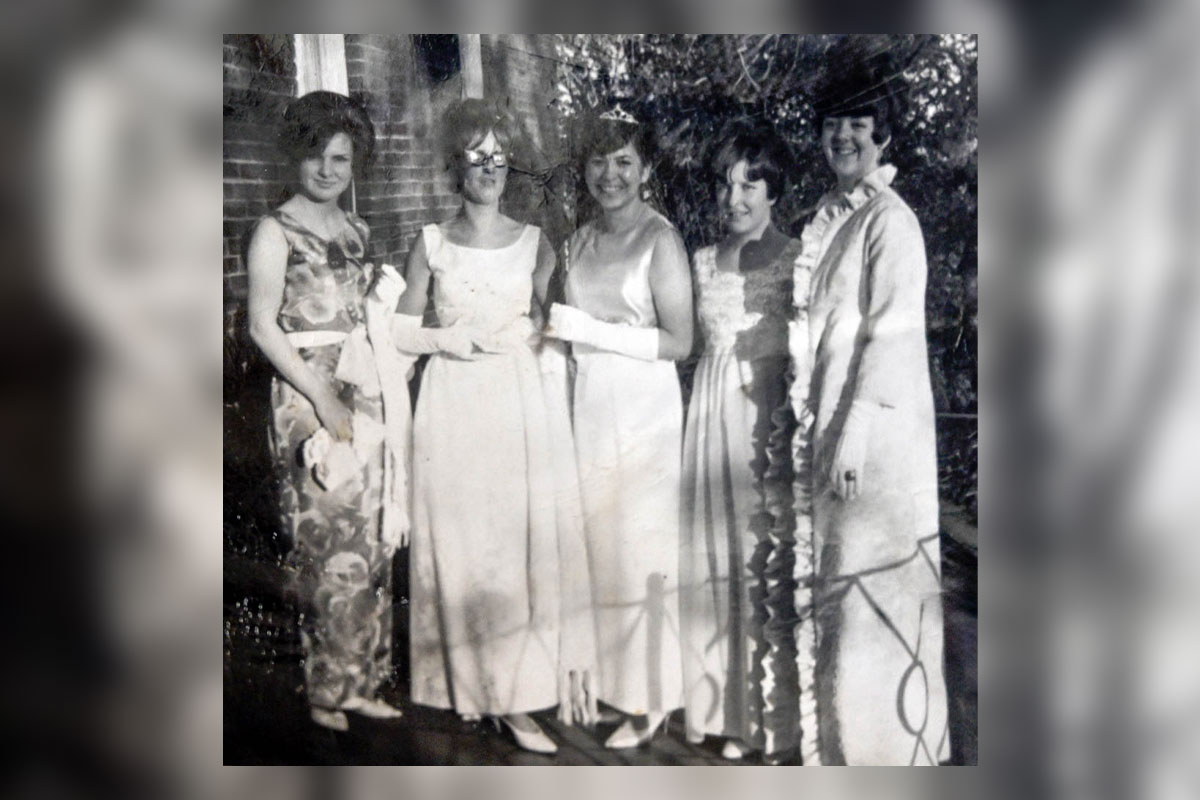
Were you named after anyone? “My aunt Rose Peltier and the Virgin Mary. It was normal to have a saint as part of your name. My confirmation name is “Kateri.’ She was a Native saint before she became an official saint. There was a feast for her a week ago.”
Most important event in your life? “Having children and being a grandmother to nine grandchildren: Gabby, William, Peter, Jeffery, Lea, Grace, John, Codie Jane and Rhea. I love all of them and I am teaching them to pray.”
Favourite pets? “Two German shepherds, Sarge and Tim. We also had a beagle, a Jack Russell and lots of cats. At one time, Annelind had 13 cats in the barn. The oldest feline was Goldilocks. Annelind liked to talk to the dogs and cats. In grade three she brought home a very sick cat. She tried to save it with a drop of Pepto Bismol and sat up with the cat all night. Sadly, the cat died in the morning and Annelind missed a half day of school. She had wanted to be a vet when she grew up, but she changed her mind. ‘I want to be a doctor now, because people can tell me what’s wrong, animals can’t.’”
Favourite season? “Spring, June. Everything is fresh. Leaves and grass and flowers are up. June 21 is the first day of summer and Ron and I became a couple on June 29.”
Favourite collections? “Rocks. Collecting rocks with Dad. One rock had the very image of Santa Claus! Our favourite place to find them was Fossil Hill near Eagle’s nest and the Kicking Mule Ranch.
Favourite celebration? “My first communion and confirmation at my wedding, which encouraged a strengthening of the heart. Family weddings and anniversaries were important too.”
Strengths? “Our Native language and the grammar and spelling for both Anishinabek and English languages. Empathy, counselling and financial assistance can also be added. If students needed money for important tasks they got it. I also provided rides to important events.
Awards or trophies? Rosemary was awarded ‘Counsellor of the Year’ at the Ontario Education Counsellors Association Conference in Toronto in the 1990s. “I counselled high school students to help increase attendance and deal with the social aspects of higher education for students heading to institutions in Sault St. Marie, North Bay, Espanola, Sudbury and here at Manitoulin Secondary School. I was also part of ALANON for alcohol addiction when my husband was battling with this. I am still a member today.”
Something you still want to do? “Travel to the east coast and to Victoria on the west coast to see my adopted grandchild, Gabby. She has a special place in my heart, too.”
Holiday traditions? “The big Pow Wow in early August. I was the Pow Wow Princess in 1967. The Pow Wow was held simultaneously with the Haweater Weekend in Little Current. Wiikwemkoong and the Little Current Lions Clubs planned these two events simultaneously.”
Other contributions? “Cambrian College Heritage Committee member. I attended meetings with Honorine Wright. Marjorie Reynolds, Margaret and Art Vondette, and I taught tap-dancing. We also taught jazz dancing, square dancing, clogging and disco dancing to children aged 6-12. One year, our group went to an international dance competition and we did quite well.”
What are you most afraid of? “Snakes and losing my licence.”
Looking back, is there something you would do differently if you could? “I would have been more patient with my dad. He was in his early 80s and moving slowly at the time. He eventually died at 84 with an infection that couldn’t be identified.”
When you were a child, was there something you wanted to be as an adult? “I wanted to be a registered nurse because I was impressed with the crisp white uniform.”
Recipe for happiness? “Offering prayers and being thankful for what you have. I have enjoyed good health. We all have the land, the sea, the earth and the sky.”
Favourite verse? The Serenity Prayer.
“My experience at Residential School balanced the trials with the triumphs and perhaps the overall memory of it all is more positive, but that was not the experience every one of us had.” Rosemary is part of the Christian Living Community, a worldwide organization. She is proud that she is part of the Wiikwemikoong Unceded Territory of Manitoulin. “Originally the six reserves on Manitoulin had the whole Island but that changed when immigration was opened to Europeans. Now we live together with everyone, and Manitoulin is still the best. It is the last place I want to be when my time comes. It is the Island of the Great Spirit, Manitou and we are blessed with many medicinal plants. I have been all over the world and there is no other place like our special Manitoulin Island.”

